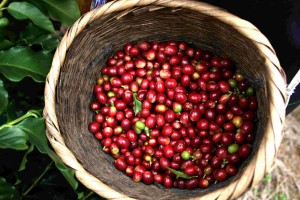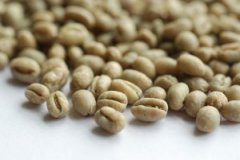Coffee beans Oceania Papua New Guinea boutique single coffee beans
Babu coffee

Coffee fruit
Papua New Guinea Papua New Guinea, also known as Papua New Guinea Papua New Guinea.
Papua New Guinea coffee is the second largest agricultural export project in Papua New Guinea, accounting for 18 percent of the total agricultural exports in 2003. In the 1990s, the country's coffee industry developed to a certain extent, with exports reaching 500 million kina in 1998. Due to the decline in world prices, the income from coffee exports dropped to 250 million genas in 2002, and rebounded to 300 million genas last year. The report says Papua New Guinea accounts for 1 per cent of global coffee production, of which 50 per cent are exported to Germany, 20 per cent to the United States and 12 per cent to Argentina.
Babu coffee
Flavor and taste characteristics: full particles, moderate acidity, mellow taste.
Papua New Guinea is an island country in Oceania. In Malay, "Papua" means "curly hair". It is said that in 1545, the explorer Retes arrived on the island and found that most of the people's hair on the island was curly, that is, the island was called "the island of curly hair", so the name was handed down.
Located in tropical Papua New Guinea, the climate is humid and rainy, rich in coconuts and coffee. Forests and mineral resources are also rich. Rabur is the sixth largest town in the South Pacific island nation and an important shipping hub. Its rich coffee and other goods are exported from this port.
Papua New Guinea has a detached and primitive natural environment and its land is vast and fertile. Its unique volcanic rock soil and abundant rainfall create excellent natural conditions for the growth of coffee. The top coffee beans in Papua New Guinea are as beautiful and precious as the country's national bird of paradise. As coffee in the country is widely grown in the highlands of 1300 to 1800 meters above sea level, coffee beans are plump and varied in taste, with pleasant acidity and fruit-like sweetness.
The coffee production in Papua New Guinea is not very high, and its coffee beans are carefully washed Arabica beans. Generally washed coffee beans are full of bright fruit aromas, but do not have a strong acidity. It is characterized by a silk-like soft taste and excellent aroma, moderate acidity, is a relatively rare variety of high-alcohol and medium-acidity coffee, whether it is used to mix Italian coffee or general comprehensive coffee, can make up for the lack of sour coffee.
If you taste Papua New Guinea coffee beans with Guatemala Antigua coffee, it will have a different taste. As we all know, Papua New Guinea coffee has the characteristics of fruit flavor and herbal aroma, while Guatemala Antigua coffee has a slightly spicy and cocoa flavor. The tip of the tongue has both fragrant fruit flavor and cocoa flavor, the two flavors blend and collide, giving people a unique new coffee experience.
Coffee must have temperature-Babu Paradise Bird Coffee
Before I made coffee, I never knew where Babu was; I didn't know about birds of paradise; I didn't know there were coffee trees there. There are many countries in the world that have not attracted our attention, and Papua New Guinea is one of them.
New Guinea is a large mountainous island shared by Indonesia and Papua New Guinea. The island's alpine aborigines were not discovered by the Australian Mick Leahy until 1930. They retained a primitive civilization and became a paradise for anthropological studies.
What is particularly amazing is that the video taken by Mick when he first went to the mountain to meet the aborigines was preserved and later combined with interviews with the locals to produce a documentary about the contact between the Highland aborigines and modern civilization. The film is called first contact (first contact). After its release in 1983, the film shocked the world and won numerous awards. Images like this have never been seen before and have never been seen since, and they are really excellent. The follow-up story is also fascinating: Mick grew up in a tribe with Joe, the son of a local aboriginal, and later received a Western education in a white school, becoming a middleman across two cultures. He planted coffee in the highlands and made a fortune. His attempt to expand the coffee plantation was recorded and made into two documentaries with "first contact" and called the Highland Triple.
The law of history always tells us that a heterogeneous new civilization must bring a period or a certain degree of loss and pain to the recipient. But the situation in Papua New Guinea looks even worse, and what is happening there can only be described as chaos and bloodshed. No one can say exactly why. Frequent violence, endless tribal vendetta, lack of resources, lack of medicine and medicine. The old is dying, and the new is not being built. People there say they don't see the hope of this country.
Women in Papua New Guinea are generally subjected to brutal domestic violence. In traditional culture, women have always been regarded as the private property of men and can be beaten and scolded at will, and they do not live together after marriage and sleep with their wives at night. Although the introduction of modern civilization made the couples there learn to live together, they never learned how to get along. In addition, men are idle and pay attention to appearance, while women farm and support their families, bearing all the burden. Some anthropologists believe that this custom stems from the imitation of birds of paradise (birds of paradise, local specialties). The male bird has beautiful feathers, while the female is not beautiful and is responsible for laying eggs and hatching eggs.
The vast majority of coffee in Papua New Guinea is organic coffee, but it is not intentional by the local people. it is really because of inconvenient transportation and economic hardship, the average coffee farmer is determined not to buy it, nor can he afford chemical fertilizer. Bird of Paradise coffee has a lively flavor, with bright sour and fruity aromas. Unlike the dreary taste of Asian beans, it has the meaning of African beans. As a result, although it is not a famous show, it is cleverly likable. It comes from the high mountains on the island, and there are birds of paradise singing on the coffee tree. In the past, my knowledge and imagination were limited to this.
The more you understand, the heavier you feel. A cup of Bird of Paradise unexpectedly carries a cultural tragedy. Coffee farmer Joe eventually went bankrupt because of tribal clashes that caused a large number of casualties when the coffee was ripe and needed to be picked. As a result, the coffee rotted in the field, and Joe went to a civilized land.
Important Notice :
前街咖啡 FrontStreet Coffee has moved to new addredd:
FrontStreet Coffee Address: 315,Donghua East Road,GuangZhou
Tel:020 38364473
- Prev

South America Brazil coffee giant Brazil Santos boutique coffee beans
The Brazilian Santos variety comes from South America and Brazil is the world's number one coffee producer, accounting for about 30% of the world's total production. Almost all Santos coffee is produced in southeastern Brazil and is the best coffee in Brazil. Raw bean granules can be found from medium to large, but without green, they are neutral coffee. Brazil's "Vicky Gotti Manor" comes from Brazil's top boutique coffee estate "Fazenda\ Var".
- Next

The most famous coffee in Guatemala, Vivetnam fruit coffee beans.
Vivette Nanguo Guatemala became a Spanish colony in 1524, became independent from Spain in 1821, and had a free revolution in 1871, which established the principle of separation of church and state and laid the foundation of the rule of law.
Related
- Guji coffee producing area of Guji, Ethiopia: Humbela, Shakiso, Wulaga
- What is the most expensive variety of Qiloso in BOP multi-variety group?
- How to store the coffee beans bought home?
- Why are Yemeni coffee beans so rare now?
- Ethiopian Sidamo all Red Fruit Sun Sun Santa Vini Coffee beans
- SOE is mostly sour? What does it mean? Is it a single bean? what's the difference between it and Italian blending?
- Is Italian coffee beans suitable for making hand-brewed coffee?
- How to choose coffee beans when making cold coffee? What kind of coffee beans are suitable for making cold coffee?
- Just entered the pit to make coffee, what kind of coffee beans should be chosen?
- Can only Japan buy real Blue Mountain Coffee? What are authentic Jamaican Blue Mountain coffee beans?

